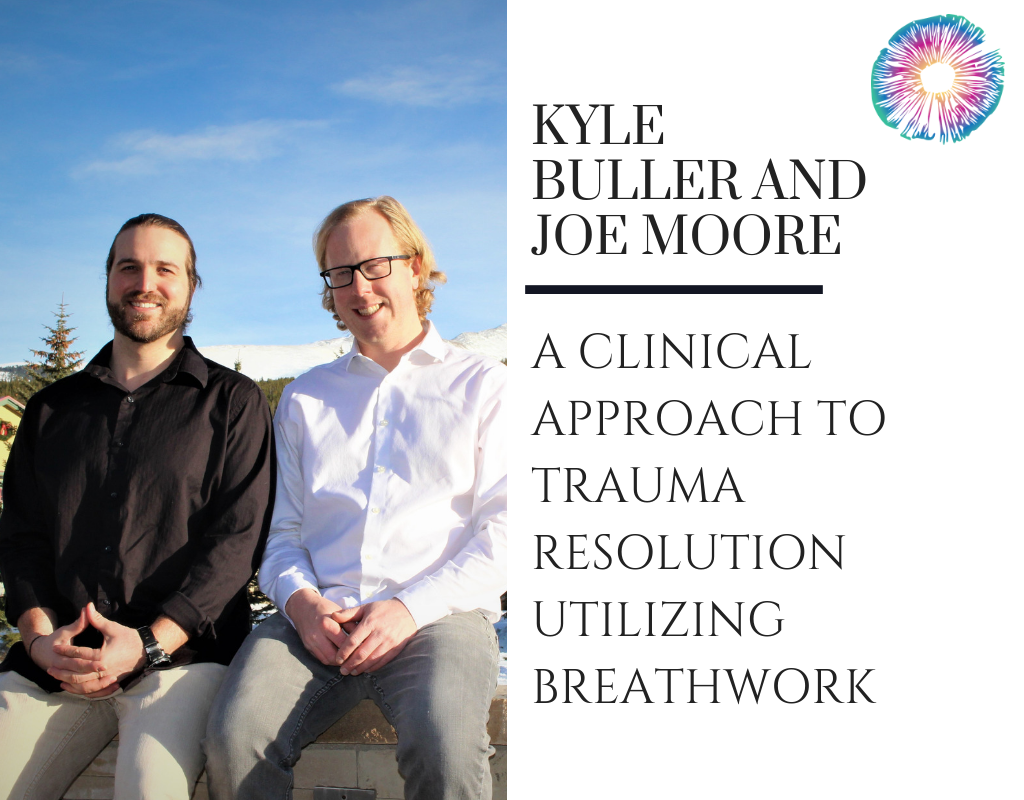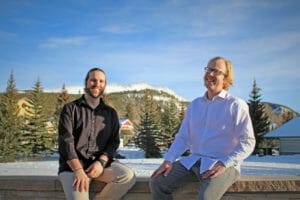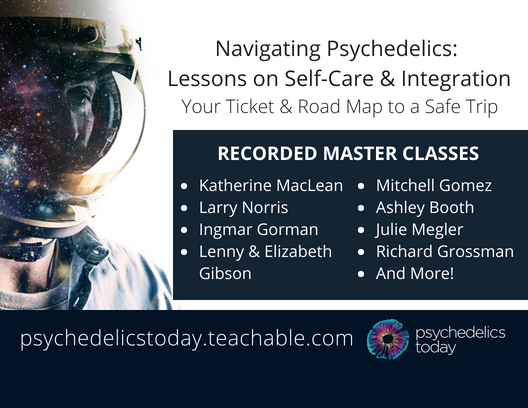
In this episode, hosts Joe and Kyle sit down and engage in conversation together, covering topics such as Kyle’s capstone project, Trauma and Breath: A Clinical Approach to Trauma Resolution Utilizing Breathwork, current events, upcoming plans and the hurdles as a Psychedelic education and information company in a space of both ethical and unethical findings.
3 Key Points
- Kyle will be soon finishing his capstone project, Trauma and Breath: A Clinical Approach to Trauma Resolution Utilizing Breathwork.
- The project is on the clinical application of Breathwork Therapy. The goal will be to use an Integrative Breathwork Therapy model that can be used adjunct to Psychedelic Therapy.
- Joe and Kyle find out about a lot of things that are potentially harmful in the psychedelic world. They are “journalists”, but without money for legal defense. It’s a difficult time, where a lot of unethical stuff is happening around psychedelics, and Joe and Kyle feel responsible for the safety of the community.
Support the show
- Patreon
- Leave us a review on iTunes
- Share us with your friends – favorite podcast, etc
- Join our Facebook group – Psychedelics Today group – Find the others and create community.
Navigating Psychedelics
Show Notes
Kyle
- Kyle’s been doing an internship a few days a week and has been doing undergraduate student counselling
- He’s been working on his capstone project that has consumed a ton of his time and energy
- He wants to thank Elizabeth Gibson and Alan Davis who have been reviewing his capstone project for him
Breathwork Therapy Capstone
- Writing the capstone in the Clinical Mental Health Counseling Program means it needed to have clinical applications
- Kyle went to the MDMA Training in 2016, and he talked to Michael Mithoefer, who told him that if he wants to get involved, to figure out something that can be an adjunct to psychedelic therapy
- Kyle thought that he could use an Integrative Breathwork Therapy model that could then be used adjunct to Psychedelic Therapy
Styles of Breathing
- A deep, slow belly breath can be very activating to the parasympathetic nervous system that calms the body down
- A fast, intense breath can be more active and can bring out traumas
The Phases
- Phase 1: Grounding and Emotional Regulation (slow, deep breath, the therapeutic alliance)
- They screen for people that have had a traumatic experience, spiritual emergence or psychosis in the last 6 months so they know where to start with a patient
- They use a capscore (a test that looks at the severity of someone’s PTSD) to determine where to start in therapy
- Joe mentions that it would be beneficial to see what level of capscore a patient responds positively or negatively to a Breathwork session
- Phase 2: Using Breathwork in a somatic processing phase
- Stage 1: Somatic experiencing (helping people breathe into the sensations in the body)
- The body has a ‘secret language’, of how our body holds onto trauma
- Turning inward and being more in touch with inner sensations (tightness, heat, etc)
- Stage 2: A more activating of “blockages” by intensifying or speeding up the breath
- Stage 1: Somatic experiencing (helping people breathe into the sensations in the body)
- Phase 3: Outside of the clinical scope, placing someone in a full group, 3 hour Breathwork that might bring up collective traumas or spiritual experiences
- The goal would be to get people through therapy to get them to the larger group process, create community and form social connections
- It needs to start with the clinical space, one-on-one to generate trust. Once they have that trust and confidence, they can go out and explore the more transpersonal and spiritual aspect of themselves
Bandwidth in Communication
- We have modems, cable, fiber optics, 3g, 4g, 5g cell networks, etc.
- Video communication, phone conversation is great, but it’s 2D
- When its in person, depth of field kicks in, you’re able to see body language and intonation
- Living in a tribe of 150 people and creating community, we’d be using our full bandwidth, bringing the human organism back to its full capacity
- “Therapists get taught clinical practices, but they aren’t taught about theory and practice of trauma” – Joe
Psychedelic News Responsibility
- MAPS just published an article about an online Breathwork workshop
- Joe says its not a bad thing, but there are risks by not having an in person facilitator
- “We find out about a lot of things that are potentially harmful in the psychedelic world, our relationship to coming out about that stuff is tricky. Yes, we are “journalists”, but without money for legal defense.” – Joe
- Joe says he feels responsibility for safety in the community
- Kyle says the psychedelic community sometimes feels like the wild west due to the lack of education. “When unethical stuff arises, what is our responsibility?” – Kyle
- “We are trying to understand our future, and not put ourselves in a bad place, all while keeping you all safe and continuing to serve the community” – Joe
- How LSD alters our consciousness
Psychedelics Today Books
Trip Journal
Integration Workbook
Both books will be on Amazon for purchase in the next few weeks
Arizona Psychedelic Conference
- Arizona Psychedelic Conference
- Joe and Kyle will be guiding 2 Breathwork workshops
- They are excited to connect and meet people
- Kyle and Joe will be going to another conference in March
- The title of the conference is “Can Exceptional Experiences Save Humans, from Ecological Crisis”
- “If were going to survive on earth, we’ve got to be a little more global. We are all linked to this spaceship that we are traveling through space on, and there are limited resources on this thing. We are answering a lot of these questions through psychedelics” – Joe

About Kyle
Kyle’s interest in exploring non-ordinary states of consciousness began when he was 16-years-old when he suffered a traumatic snowboarding accident. Waking up after having a near-death experience changed Kyle’s life. Since then, Kyle has earned his B.A. in Transpersonal Psychology, where he studied the healing potential of non-ordinary states of consciousness by exploring shamanism, plant medicine, Holotropic Breathwork, and the roots/benefits of psychedelic psychotherapy. Kyle has co-taught two college-level courses. One of the courses Kyle created as a capstone project, “Stanislav Grof’s Psychology of Extraordinary Experiences,” and the other one which he co-created, “The History of Psychedelics.”
Kyle is currently pursuing his M.S. in clinical mental health counseling with an emphasis in somatic psychology. Kyle’s clinical background in mental health consists of working with at-risk teenagers in crisis and with individuals experiencing an early-episode of psychosis. Kyle also facilitates Transpersonal Breathwork workshops.
About Joe
Joe studied philosophy in New Hampshire, where he earned his B.A.. After stumbling upon the work of Stanislav Grof during his undergraduate years, Joe began participating in Holotropic Breathwork workshops in Vermont in 2003. Joe helped facilitate Holotropic and Transpersonal Breathwork workshops while he spent his time in New England. He is now working in the software industry as well as hosting a few podcasts. Joe now coordinates Dreamshadow Transpersonal Breathwork workshops, in Breckenridge, Colorado.



